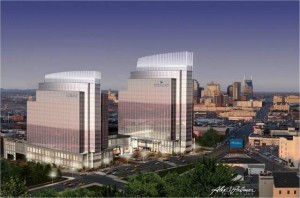The nation’s largest private hospital chain is close to landing Metro’s third-most-generous financial incentive package ever, totaling a projected $66 million, in exchange for filling a prominent midtown eyesore with headquarters offices and bringing 1,750 new jobs to Davidson County.
Metro Council is set to consider the arrangement between Nashville-based HCA and Metro — one of Mayor Karl Dean’s signature economic development proposals — with a vote Tuesday on a trio of bills outlining tax breaks and incentives key to the proposed office towers dubbed West End Summit.
Dean and HCA officials announced the project in late September to great fanfare for solidifying Nashville as a “health care capital,” the mayor said at the time, while producing the city’s biggest jobs announcement since the late-1990s relocation of Dell Corp. and erasing a blemish on Nashville’s central business corridor.
The towers, a $200 million private investment, are to occupy an 80-foot-deep crater at 1600 West End that became known as “Lake Palmer” after developer Alex Palmer abandoned a West End Summit concept six years ago.
Now the HCA deal is headed before the council, which has historically signed off on incentives offered up by Dean’s administration in the name of job growth. This one is expected to be no different.
“To have the number of jobs anticipated that the deal is going to bring to Nashville is a no-brainer,” council Budget and Finance Committee Chairman Lonnell Matthews Jr. said. “When you think about the amount of incentives, there are also some pretty stiff penalties for not meeting certain benchmarks on the positions and bringing the jobs.”
Few question mayor’s approach
For Metro, Dean’s HCA incentive proposal ranks in scale only behind then-Mayor Phil Bredesen’s 1999 incentive package for Dell, $120 million, and his own administration’s 2010 deal with Omni Hotels to anchor Music City Center. The latter gave the hotel chain a present value of $103 million in incentives, plus tax increment financing that grew that figure even larger.
Dean has aggressively pursued direct incentives to companies during his time in his office, while his predecessor Bill Purcell never executed the strategy. The current mayor’s approach has only a handful of council skeptics.
“I feel like a broken record,” said Councilman Josh Stites, who has voted against tax breaks awarded to LifePoint Hospitals Inc. and Ryman Hospitality Properties over the past year. He intends to do the same with HCA. “You can look at downtown and there are some buildings that shaped downtown, as this would do for West End, that received zero tax abatements.
“It is a huge fallacy to say that we have to give tax abatements in order for these companies to come here.”
Under the latest deal, two HCA affiliates would initially anchor more than half the estimated 750,000 to 900,000 square feet of the approximately 20-story buildings’ office space. Parallon Business Solutions, an HCA subsidiary based in Williamson County that provides revenue cycle and business process expertise, would bring 750 jobs across the county border. The Sarah Cannon Research Institute, which provides oncology research services, would take its 200 existing jobs from a different West End location to the new West End Summit.
On top of these figures, HCA’s relocation and expansion are expected to generate an additional 1,000 jobs by 2020. Salaries are estimated to range from $80,000 to $85,000. Project leaders plan an early 2015 opening of West End Summit.
Metro would give HCA a 100 percent property tax discount for 15 years, capped at $3 million a year, plus a five-year extension if the company continued to occupy its share of office space, under one ordinance going before the council. In separate council resolutions, HCA would net a one-time $1 million payment to cover relocation costs as well as a $500 incentive grant per employee over seven years.
“The city’s participation is an investment in high-quality jobs, economic growth and an opportunity for infill development along one of our most important economic corridors,” Dean said in a prepared statement.
The state has pledged kicking in a $7.5 million economic development grant for the HCA project.
‘Pretty crucial’
According to a legal analysis by Metro Council attorney Jon Cooper, the justification for Metro’s $3 million annual property tax abatement over 20 years is to match the cost of West End Summit’s parking garage, which would not be required were the company to build in Williamson County.
“I think in this instance we were in direct competition with surrounding counties,” Councilman Ronnie Steine said. “And it’s clearly, in this urban area, more expensive to build the parking than it would be if they had decided to go to a surrounding county.”
Steine called the HCA incentive “amongst the best we’ve ever worked on.” He said that while it ranks “pretty high” in scale, it also ranks favorably. On top of job creation, Steine said, “We’re also going to build on a space that is pretty crucial to the development of the city. To get that hole filled up, I think that’s going to spur a lot of other things.”
HCA spokesman Ed Fishbough said the company wouldn’t get into specifics on where else it had considered building. “But we have said we could have gone outside Davidson County, and the incentives were vital, making West End Summit the right decision for us,” he said.
Stites called the justification for the 20-year property tax discount “rubbish” and “great marketing by our mayor’s office.”
The Metro-HCA agreement contains provisions aimed at protecting Metro if HCA doesn’t fulfill its job projections: 1,000 by 2016 and larger benchmarks for each subsequent. For each 100 jobs the company failed to produce in Davidson County, HCA’s property tax discount would lower by $300,000.
Metro is expected to collect a sliver of new property tax revenues from the project, $17 million, over the 20-year life of the abatement. The project’s developer, Alex S. Palmer & Co., would be required to contract minority or women-owned businesses on at least 20 percent of its construction work.
HCA is considered the largest nongovernmental hospital operator in the U.S. In 2011, it produced more than $30 billion in revenue and a net income of $2.45 billion, the council’s legal analysis reads.
Contact Joey Garrison at 615-259-8236 orjgarrison@tennessean.com.
Source: Tennessean










